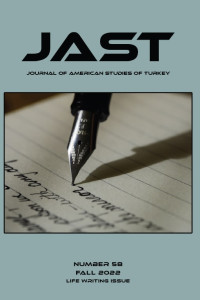Reading Lists as Manifestos: Karla F. C. Holloway’s Bibliomemoir BookMarks: Reading in Black and White
Abstract
This article examines the genre of bibliomemoir as a type of autobiographical writing that focuses on an author’s life story told through references to books and personal reading experiences. Until recently, bibliomemoirs have received little academic attention. This is, however, hardly an adequate response to the growing number of life narratives written within this pattern. Over the past few decades, memoirists have underlined the importance of reading practices, recounting and discussing literature that was formative in their writing career. Through such reading lists, authors can draw a bridge between their own beliefs, and tenets expressed by those whom they consider to be authority figures. Thus, with such allusions to literary colleagues, writers of bibliomemoirs are able to claim their place within the historical, cultural and academic continuity. In the present study, I argue that African American authors attribute particular importance to descriptions of their literary backgrounds due to the role education plays in establishing an individual’s social status. While some African American writers allude to the authority of white European literary tradition, others assert their racial heritage through stressing interest in religious oral texts of the Deep South. Using Karla Holloway’s 2006 memoir BookMarks: Reading in Black and White, I analyze how writers’ personal accounts of reading experiences allow them to affirm their place among the pantheon of literary personae and to prove connection to the wider racial legacy.
Keywords
Life Narrative Biblio-Autobiography Bibliomemoir Karla F.C. Holloway African American Literature Racial Legacy
References
- Butler, Judith. Giving an Account of Oneself. Fordham UP, 2005. Carby, Hazel V. Race Men. Harvard UP, 1998.
- Douglass, Frederick. Narrative of the Life of Frederick Douglass, An American Slave. Barnes and Noble, 2003.
- Fletcher, Michael A. “Michael Eric Dyson: A Scholar and a Hip-Hop Preacher.” The Journal of Blacks in Higher Education, no. 27, 2000, pp. 74–77.
- Reading Lists as Manifestos: Karla F. C. Holloway’s Bibliomemoir BookMarks: Reading in Black and White
- Frey, Dieter and Felix C. Brodbeck. “Group Processes in Organizations.” International Encyclopedia of Social and Behavioral Sciences, edited by Neil J. Smelser and Paul B. Baltes, vol. 20, Pergamon, 2001, pp. 6407-6413.
- Friedman, Susan Stanford. Mappings: Feminism and the Cultural Geographies of Encounter. Princeton UP, 1998.
- Gekoski, Rick. “Outside of a Dog: A Bibliomemoir.” https://gekoski. com/outside-of-a-dog-a-bibliomemoir.html. Accessed 6 October 2022.
- Hochman, Barbara. “The History of Reading and the Death of the Text.” American Literary History, vol. 21, no. 4, 2009, pp. 845- 858.
- Holloway, Karla F.C. BookMarks: Reading in Black and White. Rutgers UP, 2006.
- Lerer, Seth. “Epilogue: Falling Asleep over the History of the Book.” PMLA, vol. 121, no. 1, 2006, pp. 229-234.
- ---. Children’s Literature: A Reader’s History, from Aesop to Harry Potter. The U of Chicago P, 2008.
- Lo, Jonathan C.Y. “Understanding Bibliomemoir Through Scriptural Reminiscence: Comparing Augustine and Brenda Walker.” Eras Journal, vol. 22, no. 1, 2020, pp. 26-50.
- McCoy, Beth A. “Race and the (Para)Textual Condition.” PMLA, vol. 121, no. 1, 2006, pp. 156-169.
- Oates, Joyce Carol. “Deep Reader: Rebecca Mead’s My Life in Middlemarch,” The New York Times, 2014, https://www. nytimes.com/2014/01/26/books/review/rebecca-meads-my-lifeinmiddlemarch.html
- Sainte-Beuve, Charles. “Chateaubriand v Otsenke Odnogo iz Blizkih Druzey v 1803 g.: (Opredelenie «Biograficheskogo Metoda»)” [Chateaubriand as Assessed by One of His Close Friends in 1803: (Definition of “Biographical Method”). Zarubezhnaya Estetika i Teoriya Literatury 19-20 vv., Moscow, 1987.
- Smith, Sidonie, and Julia Watson. Reading Autobiography: A Guide for Interpreting Life Narratives. U of Minnesota P, 2001.
Abstract
Keywords
Life Narrative Biblio-Autobiography Bibliomemoir Karla F.C. Holloway African American Literature Racial Legacy
References
- Butler, Judith. Giving an Account of Oneself. Fordham UP, 2005. Carby, Hazel V. Race Men. Harvard UP, 1998.
- Douglass, Frederick. Narrative of the Life of Frederick Douglass, An American Slave. Barnes and Noble, 2003.
- Fletcher, Michael A. “Michael Eric Dyson: A Scholar and a Hip-Hop Preacher.” The Journal of Blacks in Higher Education, no. 27, 2000, pp. 74–77.
- Reading Lists as Manifestos: Karla F. C. Holloway’s Bibliomemoir BookMarks: Reading in Black and White
- Frey, Dieter and Felix C. Brodbeck. “Group Processes in Organizations.” International Encyclopedia of Social and Behavioral Sciences, edited by Neil J. Smelser and Paul B. Baltes, vol. 20, Pergamon, 2001, pp. 6407-6413.
- Friedman, Susan Stanford. Mappings: Feminism and the Cultural Geographies of Encounter. Princeton UP, 1998.
- Gekoski, Rick. “Outside of a Dog: A Bibliomemoir.” https://gekoski. com/outside-of-a-dog-a-bibliomemoir.html. Accessed 6 October 2022.
- Hochman, Barbara. “The History of Reading and the Death of the Text.” American Literary History, vol. 21, no. 4, 2009, pp. 845- 858.
- Holloway, Karla F.C. BookMarks: Reading in Black and White. Rutgers UP, 2006.
- Lerer, Seth. “Epilogue: Falling Asleep over the History of the Book.” PMLA, vol. 121, no. 1, 2006, pp. 229-234.
- ---. Children’s Literature: A Reader’s History, from Aesop to Harry Potter. The U of Chicago P, 2008.
- Lo, Jonathan C.Y. “Understanding Bibliomemoir Through Scriptural Reminiscence: Comparing Augustine and Brenda Walker.” Eras Journal, vol. 22, no. 1, 2020, pp. 26-50.
- McCoy, Beth A. “Race and the (Para)Textual Condition.” PMLA, vol. 121, no. 1, 2006, pp. 156-169.
- Oates, Joyce Carol. “Deep Reader: Rebecca Mead’s My Life in Middlemarch,” The New York Times, 2014, https://www. nytimes.com/2014/01/26/books/review/rebecca-meads-my-lifeinmiddlemarch.html
- Sainte-Beuve, Charles. “Chateaubriand v Otsenke Odnogo iz Blizkih Druzey v 1803 g.: (Opredelenie «Biograficheskogo Metoda»)” [Chateaubriand as Assessed by One of His Close Friends in 1803: (Definition of “Biographical Method”). Zarubezhnaya Estetika i Teoriya Literatury 19-20 vv., Moscow, 1987.
- Smith, Sidonie, and Julia Watson. Reading Autobiography: A Guide for Interpreting Life Narratives. U of Minnesota P, 2001.
Details
| Primary Language | English |
|---|---|
| Subjects | North American Language, Literature and Culture |
| Journal Section | Research Article |
| Authors | |
| Publication Date | November 15, 2022 |
| Published in Issue | Year 2022 Issue: 58 |
JAST - Journal of American Studies of Turkey


